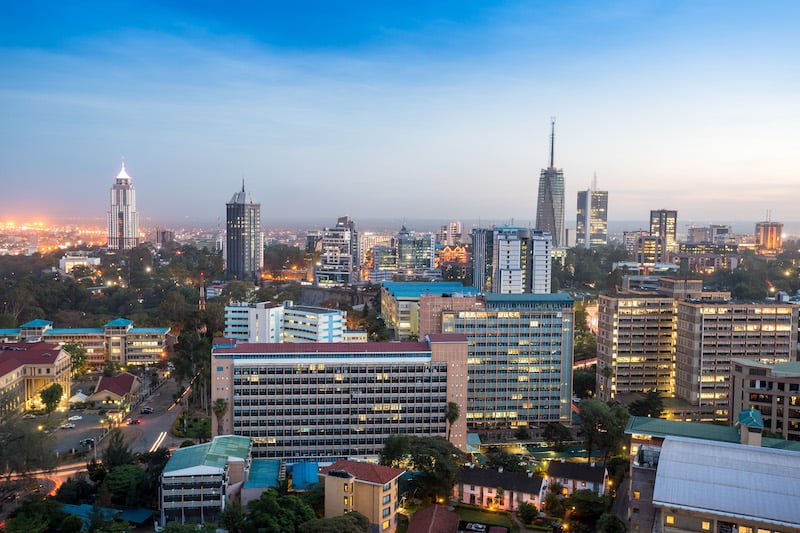Thursday, June 30, 2022
Companies should direct their green investment sights to African markets, where they could bypass expensive processes towards energy neutrality. With almost no transition costs, they are economies demanding capital needs of $2 trillion, mostly in high technology. An investment arsenal with sufficient capacity to address sustainable industrial reconversion in the continent most affected by climate change.
IGNACIO J. DOMINGO
"Africa is the scenario of opportunity for companies to circumvent with high technology their excess CO2 emissions and build their roadmap to energy neutrality." This is how clear Kartik Jayaram, a McKinsey partner in Nairobi, was when he unveiled the U.S. consulting firm's Africa's Green Manufacturing Crossroads. An analysis in which its experts point to African markets as the ideal investment spaces in which to implement energy transition plans: from their current fossil-based industries to their future businesses with net-zero CO2 emissions in 2050. No conversion costs. Only through its active collaboration in a green investment process that this services firm estimates at $2 trillion, and whose resources would be allocated to infrastructure and clean energy networks, preferably of technological capital and capable of generating 3.8 million jobs. And they offer an inestimable incentive to companies: because, on the one hand, they fuel the disbursements for their energy reconversions and, on the other, in the absence of clear commitments to decarbonization in their industrial firms, they leave open the possibility of doubling, up to 830 megatons, their targets of CO2 reduction to the atmosphere at the halfway point of the century. This is ample room for maneuver and that should be greatly considered by the global private sector, which should take "decisive action" in Africa. Within its investment portfolios. Because a third of its emissions come from its cement plants and another 13% from coal-fired plants. Both segments are easy to restructure.
As if that were not enough, McKinsey stresses that African nations need green financial instruments. From carbon credits to green bonds; as well as sustainable insurance or loans that are linked to productions without CO2 footprint. The "decarbonization of its industries alone will require 600 billion dollars", while the remaining 1.4 trillion dollars will be used to "create and promote businesses with a green seal". Among those mentioned are the electric car, bioethanol, green hydrogen or cross-laminated timber, essential for building with no polluting materials. CO2 capture technology and technology for storing and producing clean hydrogen "would contribute decisively to Africa's green industrial conversion".
The field of international cooperation is also drawing attention to Africa's green future. The UK Government's FSD (Financial Sector Deepening) for this continent —with funds focused on advancing financial and business centers among its Commonwealth partners— finds that three of its once influential overseas territories (South Africa, Ethiopia and Kenya) are demanding $280 billion worth of sustainability and digitization initiatives to address the threats of climate change in 35 of their cities by 2050. In three markets with high evolutionary potentials in Smart Cities. On the most rapidly urbanizing continent. Under three crucial pillars: low emissions; economic development against climate change; and urban resilience. And three backbones, aimed at plans for "compact growth" between cities; connected infrastructures and clean technologies. Africa has increased its urban population twentyfold between 1950 and 2015; to over 567 million, making it imperative to "design inclusive planning processes." Its cities will be home to 950 million people by 2050. South Africa will claim $215 billion in investment in its cities; Kenya, $27 billion; and Ethiopia $42 billion. Investments in its 35 urban centers with more than 250,000 inhabitants will generate profits in excess of $1.1 trillion. With Johannesburg leading the way in capital returns —at 260 billion— ahead of Nairobi, with 100 billion, the Foreign Office predicts.

Green energy finance in Africa will be a business worth trillions of dollars. With the challenge of lessening the effects of climate change in one of the most vulnerable territories, where the average temperature has increased by 1 degree Celsius between 1901 and 2012 and is expected to rise by up to 2 degrees Celsius compared to the pre-industrial level between 2080 and 2100, and heat waves have caused weather disturbances, floods and droughts, which have had a decisive impact not only on agricultural production, but also on the geostrategic order, because they have also triggered armed conflicts and economic crises, according to the World Meteorological Organization (WMO).
This dual vision of business opportunities in the most fragile region in the face of the climate challenge, is also corroborated by Deloitte, whose engine room supports the creation of global funds "to shape and manage the sustainable transition in Africa on a large scale," explains Mario Fernandes, its Power Utilities and Renewables director, and with which to increase financial facilities, improve the business climate and spur the growth of international private sector projects. In defense of renewable energy mixes. He emphasizes that this transition is also in line with the continent's multilateral development mandate with socio-economic objectives. To this end, Deloitte proposes a strategy based on three D's: a first phase of concerted decarbonization among its markets, abandoning fossil fuels; a second phase of decentralization of the current integrated models of generation, transmission and distribution of electricity for the benefit of the consumer. And another, in parallel, of digitalization, to create the technological capacity to boost their reconversion.
Corporate tasks outlined to shape investments in clean energy solutions that call for agreed business tactics between shareholders and investors and their borrowing entities.
Palladium, an international consulting firm, also sees that "it is time for green investments in Africa". In the wake of Covid-19 and five years since the UN Sustainable Development Goals, companies, governments and investors have begun to take decisive steps to curb climate change and rectify their investment strategies. Firms such as Apple, Microsoft, Delta Airlines have created their own resources for the mitigation of CO2 emissions and digitalization in the world. While investment firms such as BlackRock or sovereign wealth funds such as the Norwegian Sovereign Wealth Fund, with its more than $1.4 trillion in assets, have reconfigured their portfolios with increasingly stringent ESG criteria: Environmental, Social and Governance. At least a dozen investment vehicles, says the IMF, have already earmarked $2.5 billion for green opportunities in Africa. In particular, in agriculture and reforestation.
The World Economic Forum (WEF) states that "concerted global actions" could generate niches in excess of 10 trillion dollars and create 395 million jobs by 2030 in green manufacturing. In a region where a quarter of the energy assets are renewable; "more than in any other latitude". In a context of shifting global growth patterns towards biodiversity that will require a substantial increase in the $44 trillion —more than half of global GDP— at which the current business of energy generation dependent on natural sources is valued, and in which an additional $2.5 trillion per year must be contributed if the financing gap is to be closed to achieve sustainable goals by 2050.
Ignacio Domingo has spent most of his 30 years of professional practice analyzing geopolitical, international economic and capital market issues in Expansión and collaborating with media channels such as El Confidencial, Capital, Estrategias de Inversión and El Diario.es, among others. He received the award as a first runner-up for the Citigroup Award, which recognizes the best annual economic reporting.
¿Te ha parecido interesante?





